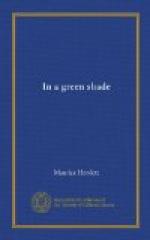Why it is—assuming the inspiration of Christ—that men have nevertheless ceased to be guided by it, and have consequently lost touch with the Kingdom of Heaven, is explained by a more hardy plunger in the stream, the Hibbert Lecturer upon “Christ, Saint Francis, and To-day.” With great learning, skill and courage he has used the documents of the Franciscan revival to illustrate what must have happened to the Christian well-spring. He shows that even in the lifetime of its founder the Franciscan fraternity crystallised under the insensible but enormous pressure of the world, the flesh and (doubtless) the devil. Saint Francis of Assisi, for instance, taught literal poverty—abstinence from money, goods and books. His Franciscans wouldn’t have it. They asked for money and took it. Not always directly, but always somehow.
“By God we owen forty pound for rent!” said Chaucer’s Franciscan when pressed by the good wife to declare what ailed him; and he got his forty pound. Saint Francis told them to build churches like barns; they built them like cathedrals. He would have had men uninstructed in all but love; and they became the greatest schoolmen in Europe. The world, in fact, was too much with them. So also did Christ teach; and as the Franciscans modified their master’s precepts, so did Saint Paul his.
Twice, then, the world has been demonstrably wrong. Is it a possibility that Christ and St. Francis can be proved to have been right? To those who say, as Mr. Clutton-Brock does, that Christianity has failed, I should like to retort, “Let Christianity be tried.” Poverty is of the essence of it, and luckily for us poverty is coming upon us, nation and individuals, whether we deserve it or not. When we are all really poor together—in heart as well as purse—we shall have the chance of a common religion, but not till then. Now, then, comes the question: Can the high in heart become poor in heart, or the high-minded humble themselves? If it is hard for the man rich in goods to enter the Kingdom of Heaven, is it not still harder for the man stored with knowledge? How are Mr. Clutton-Brock and the Hibbert Lecturer to become as little children? How will Mr. Wells manage it? He, too, is in the stream, splashing about and apparently enjoying himself. But you may call an invisible God an invisible king, if you please, and yet be no nearer the heart of the matter. A change of definitions will not do it. And what of Sir Oliver Lodge and Sir Conan Doyle? Are their outpourings symptomatic? I don’t myself think so. They are concerned with a future life, whereas those who seek a common religion will take no account of life at all, past, present or to come, once they have found the Kingdom of Heaven. Those eloquent and (I trust) sincere gospellers are agog to dispel that sense of loss which besets us just now. It is not that we fear death so much, but that we miss the dead—and no wonder. Hence these prophets crying Lo here! and Lo there!




